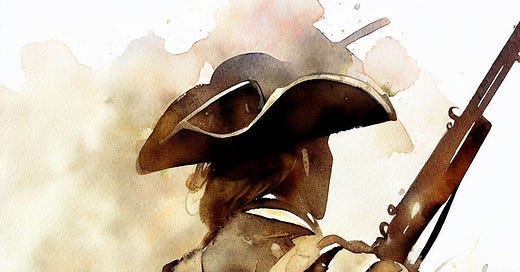Cassimore May (spelled at other times as Casimir) was born in Germany in 1754 and died in Washington County, Tennessee in 1836. He was buried outside Jonesborough where the Old Dutch Meeting House used to be, which is now a quiet grove of ash trees with a field of tall grass between it and the road. He fought in the American Revolution, either at the Battle of Brandywine with George Washington or at King's Mountain with John Sevier, or perhaps both.
This is all I know about my great-great-great-great-great-grandfather. That and according to Ancestry.com his tombstone came from Vermont.
But he may have been at King's Mountain?
That was enough to fill me with pride when I listened to a podcast about the Overmountain Men marching over the Appalachians to confront that Redcoat, Patrick Ferguson.
To recount the legend: most settlers west of the Appalachians stayed out of the American Revolution, perhaps because they didn't feel connected to the 13 colonies (after all, they had their own constitution). I don't know for sure, and I'm not a historian.
However, when British commander Patrick Ferguson ordered them to stay out of the fight, stating, "If you do not cease your opposition to the British Arms, I shall march this army over the mountains, hang your leaders, and lay waste to your country with fire and sword1," many in the East Tennessee area took the threat seriously and were not pleased.
They assembled a makeshift army at Sycamore Shoals near present-day Elizabethton, Tennessee, and marched over the mountains. They encountered Ferguson at a place called King's Mountain and defeated his army in about an hour, killing him (he was shot 5-8 times), and then returned home. These rugged backwoodsmen managed to defeat a force from the most powerful military on the planet at the time.
Boom, baby. America.
This battle became famous because Ferguson was the only British man at the fight. His entire force consisted of American colonists loyal to the English crown—Tories, Loyalists. When news spread of what happened to those Loyalists, many other English sympathizers chose not to join forces with the British when they needed it the most, leading to a surrender at Yorktown a few months later.
Those are my ancestors! My kin! Get 'em, boys! I want to hear more about this story!
Reflecting on the battle, James P. Collins, a patriot who was present, wrote:
"After the fight was over, the situation of the poor Tories appeared to be truly pitiable; the dead lay in heaps on all sides, while the groans of the wounded were heard in every direction. I could not help but turn away from the horrifying scene before me... the next morning... the scene became even more distressing; the wives and children of the poor Tories arrived in great numbers. Their husbands, fathers, and brothers lay dead in heaps, while others lay wounded or dying.2"
Oh.
Some of the dead men were killed while attempting to surrender. The Americans shouted "Tarleton's quarter!" as they killed them, seeking revenge for a massacre of American troops by another British commander earlier in the war.
The women and children of the deceased loyalists were present the day after because most of these men hailed from nearby areas. They were from North and South Carolina, Virginia, and possibly future Tennesseans.
I have always been taught that they were evil, the "bad guys" fighting against freedom-loving Americans. Maybe they were. Perhaps they also desired a peaceful life but believed that loyalty to a king was the best path. I don't know—I'm not a historian.
What I do know is that this was the first Civil War fought in my homeland—neighbors, brothers, cousins killing each other—and it was far from the last. It serves as a painful reminder that where I come from, the story I find myself in, is a place that has endured profound sorrows and witnessed too much bloodshed.
Maybe I'm not being patriotic. Yet, maybe I am — loving your country and the place you come from involves embracing the entire story, not just the parts that make you feel good about yourself.
I am grateful to be from here. I’m grateful for the many who’ve made sacrifices for this place. Our country shouldn’t have worked but it did. And a lot of that is because even with our issues, grievances, sins and failures, enough people tried to keep it together.
I'm thankful Cassimore ended up in Washington County, where his descendants still reside today. Maybe he liked the mountains as much as I do. Maybe in early July he liked the fireflies too. I don’t know how they celebrated the 4th of July back then but I’d guess for a German who became an English subject and then a new nation that he helped into existence, it meant a lot.
I guess should just eat my hot dog (and burger), light the bottle rocket (thank God for all of my fingers are still attached) and appreciate my freedom. But I don't know — I'm not a historian. I'm just a descendant of a man who was at Brandywine, King's Mountain, or both.






So good, Sam.
You possess such a beautiful economy of words, Sam. And, in so few, you leave me pondering this. Unlike you, my people have been in America a single generation. In fact, my people were in Argentina (at least the ones who weren't Indians) for less time than yours were in these mountains. It's a crazy thing, ancestry and inheritance. On July 4, I'm mostly annoyed at the fireworks and the people on Norris Lake playing bad music too loudly. But this was a good think the day after.